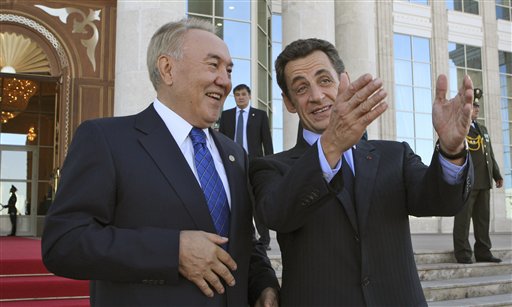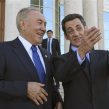
Sarkozy Develops “Strategic Partnership” with Kazakhstan
Publication: Eurasia Daily Monitor Volume: 6 Issue: 187
By:

On October 6 the French President Nicolas Sarkozy arrived in Astana on a state visit and met his counterpart Nursultan Nazarbayev. During his one day visit he also held talks with Kazakhstan’s Foreign Minister Kanat Saudabayev and the Minister of Economics and Budget Planning Bakhyt Sultanov. A Kazakh-French business forum coincided with his trip, which was designed to deepen bilateral relations (Interfax-Kazakhstan, October 6).
A wide range of issues were discussed and the 24 agreements signed ranged from energy deals to nuclear fuel and space cooperation. Trade deals valued at $6 billion will further boost bilateral energy cooperation. The French energy companies Total and GDF-Suez agreed to a 25 percent share worth $1 billion in the Russian-Kazakh Khvalinskoye gas field, in the Caspian Sea, in partnership with Lukoil (50 percent) and KazMunaiGas (25 percent). Significantly, a consortium of French companies headed by Spie Capag (Vinci group) signed a draft agreement on a pipeline between the Kashagan oil field in the Caspian Sea and Baku, which will take Kazakh oil to Europe bypassing Russia. If the negotiations prove successful, it will yield an initial 1.2 billion Euros ($1.76 billion) for French companies.
In this context Sarkozy recognized that Kazakhstan faces genuine problems as it pursues its “Path to Europe” policy, but he decided not to focus on these. Instead, he preferred to promote France’s economic interests and praise the country as a model of peace building in the region, which was a reference to its decision to abandon the nuclear weapons that Kazakhstan had inherited from the Soviet Union. Sarkozy emphasized, that he had privately discussed questions of democracy and human rights with Nazarbayev (Kazakhstanskaya Pravda, Kazakhstan Today, October 6). However, given the importance of the bilateral economic package, Sarkozy lavished praise on the country, at times going out of his way to stress how much value Paris attaches to Kazakhstan. He characterized the country as the “giant of Central Asia,” among the “top 50 countries in the world,” Paris’s “strategic” or “privileged” partner, before adding that he will visit the country frequently and had not arrived with an arrogant attitude, but hoped to genuinely reach out in a spirit of cooperation. His approach was certainly welcomed by a regime that places great emphasis upon its image.
Sarkozy evidently also wanted to strengthen the formation of ties between Central Asia and Afghanistan, primarily aimed at ending the country’s economic isolation. He advocated the creation of a regional strategy in order to work out ways in which each country might assist in this venture. He suggested that such an approach would benefit Afghanistan, and serve the interests of Central Asia (Interfax-Kazakhstan, October 6). Some of these issues will be explored through the new mechanism of a Sarkozy-Nazarbayev commission, which has been formed in order to facilitate bilateral dialogue and retain control over the direction of joint initiatives (Kazakhstan Today, October 6). In terms of Kazakhstan’s chairmanship of the OSCE in 2010, Sarkozy believes it might play a key role in Karabakh, Abkhazia and South Ossetia.
Indeed, the bilateral security agenda was dominated by Afghanistan. Sarkozy has proposed an international conference on Afghanistan in either Kabul or Astana, in order to coordinate greater efforts towards stabilizing the country and rebuilding its economy. Both leaders stated that their stance on the issue coincides; emphatically denying that there can be any military solution to Afghanistan. Nazarbayev said: “We both believe that there is no military solution to this problem. It is necessary to structure the assistance so that people in Afghanistan find their way to normal life and stop producing drug-bearing plants.” Moreover, they stressed that this issue and Iran directly affect Central Asia security, though Nazarbayev also extended this to include Iraq and the Israeli-Palestinian conflict (Interfax-Kazakhstan, October 6).
In this context the French company Thales signed a $150 million contract to supply radios to the Kazakh army. It hopes this will lead to a larger ($3 billion) contract to supply communications equipment to Kazakhstan’s armed forces –a market dominated by Russian suppliers. A bilateral military transit agreement was signed between Paris and Astana, which will allow France to use Kazakh territory and airspace to supply its 3,070 troops deployed in Afghanistan. This will involve both lethal and non-military supplies (Interfax-Kazakhstan, October 6).
Inadvertently, this agreement and Paris’s unique relationship with Astana might help secure a policy objective long pursued by Washington and London. This relates to convincing Astana to operationally deploy peacekeepers from its peacekeeping brigade (KAZBRIG) to support the International Security Assistance Force (ISAF) in Afghanistan. U.S. and U.K. military cooperation with Kazakhstan since 2003 has focused, among other key goals, on developing the country’s peace support operations (PSO) capabilities, in line with its NATO Partnership for Peace (PfP) goals (Interfax, September 25). While Washington and London have extended such assistance to expand the battalion to brigade strength, persuading Astana to send an element of this force into Afghanistan has been problematic. It runs the risk of conveying an impression that western assistance is based on expecting a payback, while underestimating the Kazakh memory of the Soviet Union’s humiliation in its war in Afghanistan; veterans of the Soviet-Afghan war continue to serve within the Kazakh armed forces. To date, this policy goal has centered on appealing to the good will of the Kazakh government based on the possibility that KAZBRIG might achieve the coveted accolade of being declared as NATO interoperable. Although it has progressed towards this status during the annual Steppe Eagle exercises conducted jointly between the U.S., U.K. and Kazakhstan, full interoperability has not been achieved, but it is close enough to permit a political decision to deploy abroad.
Sarkozy is now strongly placed to convince Astana to make such a bold commitment, not only since France enjoys closer relations with Russia, but in light of deepening Franco-Kazakh ties and more importantly the request might be less open to misinterpretation. In any case, it is unlikely that KAZBRIG would send more than a company, and almost certainly it will not participate in combat operations. Nonetheless, the prospect of Kazakh participation in force protection operations, which would be of interest to ISAF, could also be facilitated by Paris supporting KAZBRIG’s continued logistical weakness, using the new bilateral military agreement as its legal mechanism.




